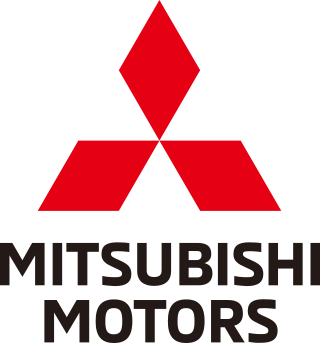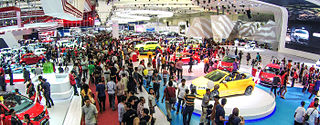
Nissan Motor Co. Ltd. is a Japanese multinational automobile manufacturer headquartered in Yokohama, Kanagawa, Japan. The company sells its vehicles under the Nissan and Infiniti brands, and formerly the Datsun brand, with in-house performance tuning products under the Nismo and Autech brands. The company traces back to the beginnings of the 20th century, with the Nissan zaibatsu, now called Nissan Group.

The automotive industry comprises a wide range of companies and organizations involved in the design, development, manufacturing, marketing, selling, repairing, and modification of motor vehicles. It is one of the world's largest industries by revenue.

Mitsubishi Motors Corporation is a Japanese multinational automobile manufacturer headquartered in Minato, Tokyo, Japan. In 2011, Mitsubishi Motors was the sixth-largest Japanese automaker and the 19th-largest worldwide by production. Since October 2016, Mitsubishi has been one-third (34%) owned by Nissan, and included in the Renault–Nissan–Mitsubishi Alliance.
JATCO Ltd, abbreviated from "Japan Automatic Transmission COmpany", is a company that manufactures automatic transmissions for automobiles.
The automotive industry in India is the fourth-largest by production in the world as per 2022 statistics. As of 2023, India is the 3rd largest automobile market in the world in terms of sales. In 2022, India became the fourth largest country in the world by the valuation of its automotive industry.
Nexus Automotive (Pvt) Ltd was an importer and assembler of General Motors products in Pakistan. The company was founded by M.A. Razaq, an expatriate Pakistani who retired as Corporate Vice President of General Motors Corporation, 1999. Balubaid Establishment of Saudi Arabia, a diversified group involved in automotive, real estate, and other industrial businesses, was an investor in the assembly business of Nexus Automotive. The company was privately owned, with ownership distributed between Pakistani and Saudi families. Nexus used the idle capacity at the Ghandhara Nissan Limited plant at Port Qasim to assemble vehicles, under a contract assembly agreement.

The automotive industry in Pakistan is one of the smallest but fastest-growing industries in the country, growing by 171% between 2014 and 2018. It accounts for 3% of Pakistan's GDP and employed a workforce of over 3.5 million people as of 2018. Pakistan is the 23rd largest producer of automobiles. Its contribution to the national exchequer is nearly Rs. 50-billion. Pakistan's auto market is among the smallest but fastest growing in Asia. 269,792 cars were sold in 2018, but this number declined to 186,716 in 2019 due to austerity measures. In the 1990s and early 2000s, Pakistan had many Japanese cars. With the launch of the first Auto Policy in 2005, Pakistan launched its first indigenous car, Adam Revo. However, after the 2008 elections, the dollar started depreciating, and due to bad governance, many automakers began to halt production, with some exiting Pakistan. Currently, the auto market is dominated by Honda, Toyota, and Suzuki. However, on 19 March 2016, Pakistan passed a second "Auto Policy 2016-21," which offers tax incentives to new automakers to establish manufacturing plants in the country. In response, Renault, Nissan, Proton Holdings, Kia, SsangYong, Volkswagen, FAW, and Hyundai have expressed interest in entering the Pakistani market. MG JW Automobile Pakistan has signed a memorandum of understanding (MoU) with Morris Garages (MG) Motor UK Limited, owned by SAIC Motor, to bring electric vehicles to Pakistan. NLC signed an agreement with Mercedes-Benz to manufacture Mercedes Actros trucks in Pakistan. Pakistan has not enforced any automotive safety standards or model upgrade policies. A few older vehicle models, including the Bolan and Ravi, continue to be sold by Suzuki. On 8 July 2021, Jolta Electric launched the production of electric motorcycles.

The Brazilian automotive industry is coordinated by the Associação Nacional dos Fabricantes de Veículos Automotores (Anfavea), created in 1956, which includes automakers with factories in Brazil. Anfavea is part of the Organisation Internationale des Constructeurs d'Automobiles (OICA), based in Paris. In 2021, the annual production exceeded 2.2 million vehicles, the 8th largest in the world.

A substantial car industry was created in Australia in the 20th century through the opening of Australian plants by international manufacturers. The first major carmaker was Ford Australia and the first Australian-designed mass production car was manufactured by Holden in 1948. Australian manufacture of cars rose to a maximum of almost half a million in the 1970s and still exceeded 400,000 in 2004. Australia was best known for the design and production of 'large' sized passenger vehicles. By 2009 total production had fallen to around 175,000 and the Australian market was dominated by cars imported from Asia and Europe.
This article provides an overview of the automotive industry in countries around the world.

The Cooper Motor Corporation, also known as CMC Motors Group Limited, is the fifth-largest importer of vehicles and fifth-largest car-assembly company in Kenya, the largest economy in the East African Community.

The automotive industry in South Korea is the fifth-largest in the world as measured by automobile unit production and also the sixth-largest by automobile export volume.

The automotive industry in Japan is one of the most prominent and largest industries in the world. Japan has been in the top three of the countries with the most cars manufactured since the 1960s, surpassing Germany. The automotive industry in Japan rapidly increased from the 1970s to the 1990s and in the 1980s and 1990s, overtook the U.S. as the production leader with up to 13 million cars per year manufactured and significant exports. After massive ramp-up by China in the 2000s and fluctuating U.S. output, Japan is currently the third largest automotive producer in the world with an annual production of 9.9 million automobiles in 2012. Japanese investments helped grow the auto industry in many countries throughout the last few decades.

Tan Chong Motor Holdings Berhad (MYX: 4405), also known as the TCMH Group or simply Tan Chong Motor (TCM) is a Malaysia-based multinational corporation that is active in automobile assembly, manufacturing, distribution and sales, but is best known as the franchise holder of Nissan vehicles in Malaysia. The company was founded in 1957 by two Malaysian entrepreneurs, Tan Yuet Foh and Tan Kim Hor, with ambitions of importing and selling Datsun cars from Japan. Tan Chong Motor Holdings Berhad was incorporated on 14 October 1972, and in 1974, the company was listed on the Kuala Lumpur Stock Exchange.

The automotive industry in Indonesia plays an important role to the economic growth of the nation, contributing 10.16 per cent of the GDP. Indonesia automotive product exports is currently higher in value than their imports. In 2017, Indonesia is the 17th largest passenger vehicle producer in the world and the 5th largest passenger vehicle producer in Asia, producing 0.98 million vehicles.

As of 2019, the automotive industry in Thailand is the largest in Southeast Asia and the 10th largest in the world. The Thai industry has an annual output of more than two million vehicles, more than countries such as Belgium, Canada, the United Kingdom, Italy, Czech Republic and Turkey.

The automotive industry in Egypt has been developing for 50 years. It can sell more than 200,000 vehicles annually and is now the second-largest market in Africa and the 42nd largest in the world, with an annual production output of over 70,000 vehicles. After experiencing many failures and success, the Egyptian Automotive industry is focusing more on assembly operations rather than manufacturing.

The automotive industry in the Philippines is one of the largest in the Asia-Pacific region, with approximately 441.4 thousand vehicles sold in 2023. Most of the vehicles sold and built in the Philippines are from foreign brands. For the most part, the Philippines is dominated by Japanese automobile manufacturers like most of its ASEAN neighbors. The automobile production in the country is covered under the Philippine Motor Vehicle Development Program implemented by the Board of Investments. In addition, there are also a small number of independent firms who assemble and fabricate jeepneys and other similar vehicles, using surplus engines and drivetrain parts mostly from Japan.













